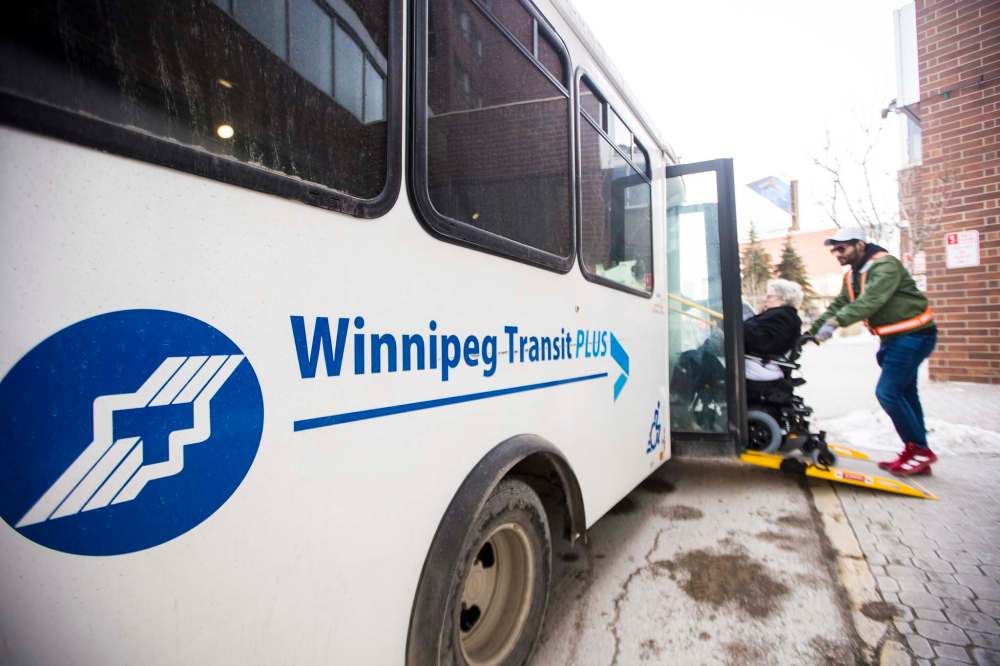Transit Plus upgrade a need, not a want
Read this article for free:
or
Already have an account? Log in here »
To continue reading, please subscribe:
Monthly Digital Subscription
$19 $0 for the first 4 weeks*
- Enjoy unlimited reading on winnipegfreepress.com
- Read the E-Edition, our digital replica newspaper
- Access News Break, our award-winning app
- Play interactive puzzles
*No charge for 4 weeks then billed as $19 every four weeks (new subscribers and qualified returning subscribers only). Cancel anytime.
Read unlimited articles for free today:
or
Already have an account? Log in here »
Hey there, time traveller!
This article was published 15/01/2020 (1562 days ago), so information in it may no longer be current.
A public transit system is only as good as its weakest route, and in Winnipeg, that seems to be Transit Plus.
The service, formerly known as Handi-Transit, faced intense criticism and was the subject of a 152-page report by the Manitoba ombudsman in 2019. The report was prompted by a 42-page complaint filed in 2016 by the Independent Resource Living Centre on behalf of Handi-Transit users.
A prominent issue in the report is accessibility of information about the service itself, no small irony for a system meant to be accessible to those unable to use the fixed-route transit system.
Among the report’s recommendations are the establishment of a dedicated email or web portal to handle complaints, clarity regarding why and how the service might reassess a client’s eligibility to use it, clear information regarding accepted payment methods and revised procedures for issuing a “no-show” charge to a client. It also recommends creating a comprehensive Transit Plus user’s guide.
In terms of actual access to transportation, the report recommends abolishing the “500-metre rule” — which dictates access is only available to users within 500 metres of a conventional transit route — and instead providing service within city limits or within 1,000 metres of an established bus stop.
The ability of Transit Plus to reach its clientele would likely be enhanced if its vehicles were allowed to use diamond lanes like other transit vehicles.
That recommendation was approved this week by the city’s public works committee. The committee also forwarded the ombudsman’s recommendation of a $3.5-million increase in funding for Transit Plus for consideration in the city’s 2020 budget.
Transit Plus’s budget in 2016, when it was still known as Handi-Transit, was roughly $13 million (and was around $7 million in deficit). Its revenues exceeded $6 million, including more than $5 million in provincial funding and $1.1 million from fares and other sources.
The city’s 2019 preliminary budget did not break down the part of the total transit budget dedicated to Transit Plus, nor the provincial funding for the service. But it did note that changes to provincial funding for the city (a major part of which was a 50-50 cost sharing of public transit terminated by the Pallister government during its first term) mean the city faces funding uncertainty for some services.
The ombudsman, in comparing Winnipeg’s paratransit service to those in other jurisdictions, highlighted the concept of comparability of services between conventional transit and paratransit. Access to transportation should be comparable for users of each type of service, even if they operate differently.
Transit Plus (and its predecessor, Handi-Transit) have been operated by private contractors since 1997.

The ombudsman’s recommendations to improve Transit Plus, if adopted, would help increase accessibility for users.
The additional $3.5-million price tag may prove difficult during the current fiscally challenging budget process, but equal access to transit should be considered a need, not a want. Without it, many people with disabilities can’t readily get to where they need to go as part of their everyday lives.
The city should promise to improve the Transit Plus service, even if it means finding additional funding within existing budgets. The province should stop forcing the city to shoulder the burden of public transit, and restore its reasonable share of funding to what, for many Winnipeggers, is an essential service.






















